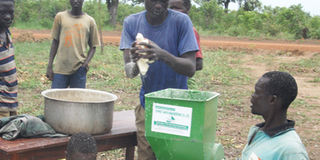WFP starts processing Gulu cassava

Farmers put cassava in the grater for processing. PHOTO BY CISSY MAKUMBI
World Food Programme (WFP) has moved to engage farmers on how best they can process cassava for value addition in Northern Uganda so as not to miss out on extra revenues from the crop.
According to WFP programme officer in Pader and Agago, Ms Judith Lumu, they expect to harvest 4,300 metric tonnes of cassava from 480 acres of land of which, some will be eaten as tubers and the rest processed.
WFP has procured pressing machines that press starch out of the raw cassava from the garden and process it into flour.
So far, two graters and hydraulic pressors have been given to the farmer groups and the process is ongoing. This year alone, six graters and two mills will be provided in the two districts. A presser and a grater can process 500-800kgs of cassava flour per hour.
Ms Lumu says due to the improved cassava cuttings given to farmers, there is limited market and low prices for fresh cassava thus processing it and having it in flour form to serve other purposes.
“Currently, one acre of cassava can produce 30-35 tonnes and we realised that the farmers cannot sell it immediately when it’s still fresh and were missing out the other benefits of the increased production.”
Ms Lumu added that the project is aimed at recovery of formerly displaced persons by enhancing income of small holder’s farmers through using staple foods to sustain low cost means to rural house-hold income through value addition. The flour can as well be used for baking snacks like pancakes, mandazi and cakes.
She said the 4,200 farmers were supported by WFP and the Food and Agricultural Organistaion (Fao) in growing high-yield drought-resistance cassava varieties since 2009 both in Agago and Pader districts.
Mr Bosco Okwera, chairperson of Farmers Forum Agago, said a sack of cassava tubers goes for Shs25,000, but its flour goes for Shs60,000.
“Cassava tubers have been rotting in the gardens because some farmers kept it there to help them in times of drought but we have not been achieving much, unlike the flour, which can be kept and it takes some time to get spoilt.”
He added that the project is also creating jobs for the community. Many are now employed at the station.
Mr Sam Okello, the coordinator production at Naads in Agago, added that the programme will be extended to other Acholi districts to curb the gap of food insecurity and improve on the house-hold income.
Farmers will earn more especially when cassava is processed into flour form. He however advised the youth who are still redundant to get into groups and become beneficiaries.




